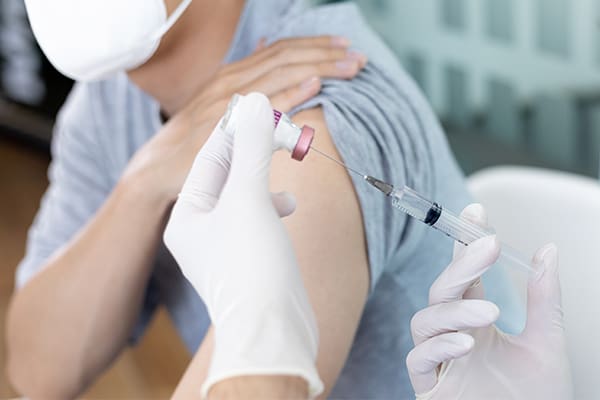
The first publicly available COVID-19 vaccine achieved emergency use authorization in December 2020. At the time, data indicated cancer patients faced high risks from COVID-19 and very low risks from the vaccine. But it was unclear whether vaccines might worsen the side effects of immunotherapy drugs, including checkpoint inhibitors.
This uncertainty worried doctors and patients alike. Some cancer patients were even hesitant to get a COVID-19 vaccine because of potential interactions. They expressed concerns that the vaccine could contribute to checkpoint inhibitor side effects.
Fortunately, a recent study may ease patients’ concerns on this topic. The study investigated the relationship between COVID-19 vaccination and immunotherapy side effects. It found no increase in immune-related side effects from checkpoint inhibitors. This news may reassure mesothelioma doctors and patients.
Study Followed 400+ Cancer Patients
Researchers at Memorial Sloan Kettering ran the study that tracked 408 patients. Each patient received the first dose of a COVID-19 vaccine within 3 months of starting or stopping ICI therapy.
About 7% of study patients had an immune-related adverse event (irAE) — a side effect related to the immune system and inflammation. Patients on ICI therapy commonly experience irAEs, with or without prior COVID vaccination.
In the study, researchers tracked the rates of irAEs in patients with various characteristics. They wanted to understand if prior irAEs might reappear after vaccination. They also wanted to see if vaccination would increase irAEs for patients starting new ICIs.
They found the following rates of irAEs for these patient groups:
- Patients who had experienced an irAE before vaccination: 6%
- Patients who started a new ICI after vaccination: 17%
According to researchers, these rates are comparable to those of unvaccinated patients. This means the COVID-19 vaccine did not boost the rates of irAEs from ICI therapy.
“The [COVID-19] vaccines are indeed safe and should be given to patients with cancer who are treated with immunotherapy.”
Dr. Ido Wolf
Head of Oncology, Tel Aviv Sourasky Medical Center
What Does This Mean for Mesothelioma Patients?
This study shows patients can get a COVID-19 vaccine without fear it will increase ICI side effects. This is encouraging, as it expands patients’ options for managing cancer and COVID-19.
This study is at least the third to investigate the effects of COVID-19 vaccines on patients receiving ICIs. It builds on the two earlier studies by including a much larger number of patients and following them longer. It provides additional evidence of the safety of COVID-19 vaccination for patients receiving ICIs.
This extra reassurance may be crucial for patients facing mesothelioma treatment decisions. It may make it easier to agree to ICI therapy. It may also give patients already on ICI therapy peace of mind and freedom to get vaccinated.
Mesothelioma patients considering immunotherapy should speak with a specialist. A mesothelioma expert can help weigh the benefits and risks of vaccination and specific treatments.




